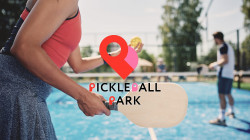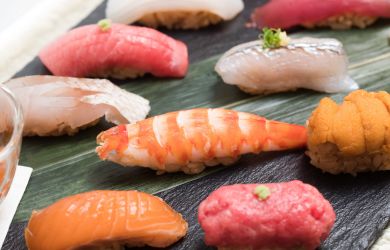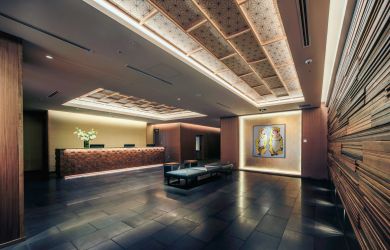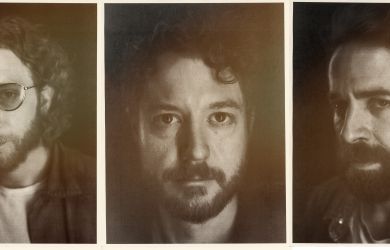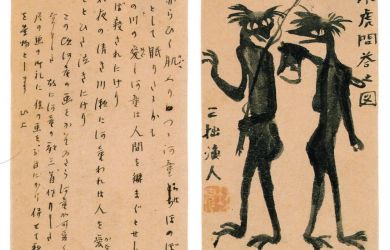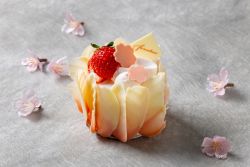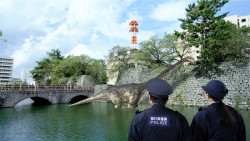
Originally published on metropolis.co.jp on January 2010

Photo by Sarah Noorbakhsh
Man cannot live on burgers alone. Well, Hirotsugu Hagiwara practically does. At Hara Kara, his gourmet hamburger restaurant in Sangenjaya, the amiable chef serves up healthy and filling gourmet burgers and eats them every day.
Hagiwara, who says he’s “around 40,” admits that he never had a hamburger until he was about 20. “I didn’t think they were very filling,” he recalls in an interview at his restaurant, which is tucked away on a side street. “I always preferred rice dishes.”
After studying service and hospitality in college and working part-time at Mos Burger, Hagiwara says he felt like drifting.
“It was the Bubble economy and everyone was getting jobs, but I really didn’t know what I wanted to do. A travel agency offered me a job, but I decided to travel for a year to places like Okinawa. My friends were working for big-name trading companies and banks, but they recommended that I stay away from those companies. So I applied for a job at McDonald’s.”
That was during the Den Fujita era at McD’s, when the legendary entrepreneur was taking the fast-food giant ahead in leaps and bounds. Hagiwara spent six years there, learning management at its “hamburger university” and working at locations in Kawasaki and his hometown of Yokohama. He then moved to the Four Seeds restaurant group, where he spent eight years as a sales manager for the company’s Hawaiian burger outlet, Kua Aina. His training complete, Hagiwara opened Hara Kara last May. The name comes from an old Japanese phrase that refers to eating and drinking camaraderie among family and friends.
“The idea was to create a gourmet burger restaurant that was not Americanized like all the chains and other shops,” Hagiwara says. “This is a Japanese hamburger restaurant with traditional touches.”
Hara Kara’s burgers, which are charbroiled on a grill, are certainly tasty and filling. The avocado (¥950) and pineapple (¥1,050) varieties are popular with women, Hagiwara says, while salarymen often go for the triple burgers (¥1,450). The 152g (5.4oz) patties are made from premium New Zealand beef, and the menu includes such Japanese touches as Karuizawa pickles and chowder made with local clams.
“Customers appreciate how healthy our burgers are,” Hagiwara says. “The fries are cooked in canola oil, and I use mostly natural ingredients—no ketchup and just a bit of sauce. They are low in calories and not greasy at all. I think this is one reason why we get a lot of older customers.”
The chef adds that he even got the stamp of approval from his parents. “Of course, the burgers were a bit too big for them,” he says. “I had to cut them in half.”
Hagiwara’s client base is quite diverse. “Customers are mainly in their 30s, 40s and 50s,” he says. “We especially get a lot of women, and they are the key. These days, if a restaurant is not popular among women, it won’t do well.”
Foreign customers have started coming in, but not so many yet. “Those who do come tend to return with friends,” Hagiwara says.
“Up until now, I didn’t create an English menu because I didn’t want to make the atmosphere too Western. Rather, we prefer to talk to foreign customers and explain the items. However, I am now thinking about an English menu.”
Hagiwara, who lives above the restaurant, starts his day around 10am. Since he is in the store every day, he eats burgers daily. “Naturally, I get a craving for other food and go out before we open or in between lunch and dinner. I wish I could find a good sushi restaurant in Sangenjaya,” he laments.
For research, he occasionally visits other gourmet burger restaurants, and vice versa. “Someone from Baker Bounce came in for lunch today,” he says, referring to the popular shop with locations in Sangenjaya and Tokyo Midtown. “We all know each other, and I think it is important to be aware of what the competition is doing. But I don’t go to McDonald’s or other chains. They are not our competitors.”
Hagiwara says he has not had to advertise yet; media come to him. Hara Kara has been featured in several Japanese magazines already.
“I have a blog that’s become popular. Word of mouth is always the best advertising tool,” he says. “It is just good to see customers come in and enjoy a burger that I made for them. That is the biggest pleasure for me.”
2-16-8 Sangenjaya, Setagaya-ku. Tel: 03-6323-1760. Open daily 11:30am-4:30pm and 6-9:30pm (LO). Closed Mon nights, except hols. Nearest stn: Sangenjaya. Hagiwara’s blog is at http://ameblo.jp/hagisann (Japanese).
Chris Betros is the editor of Japan Today (www.japantoday.com).
